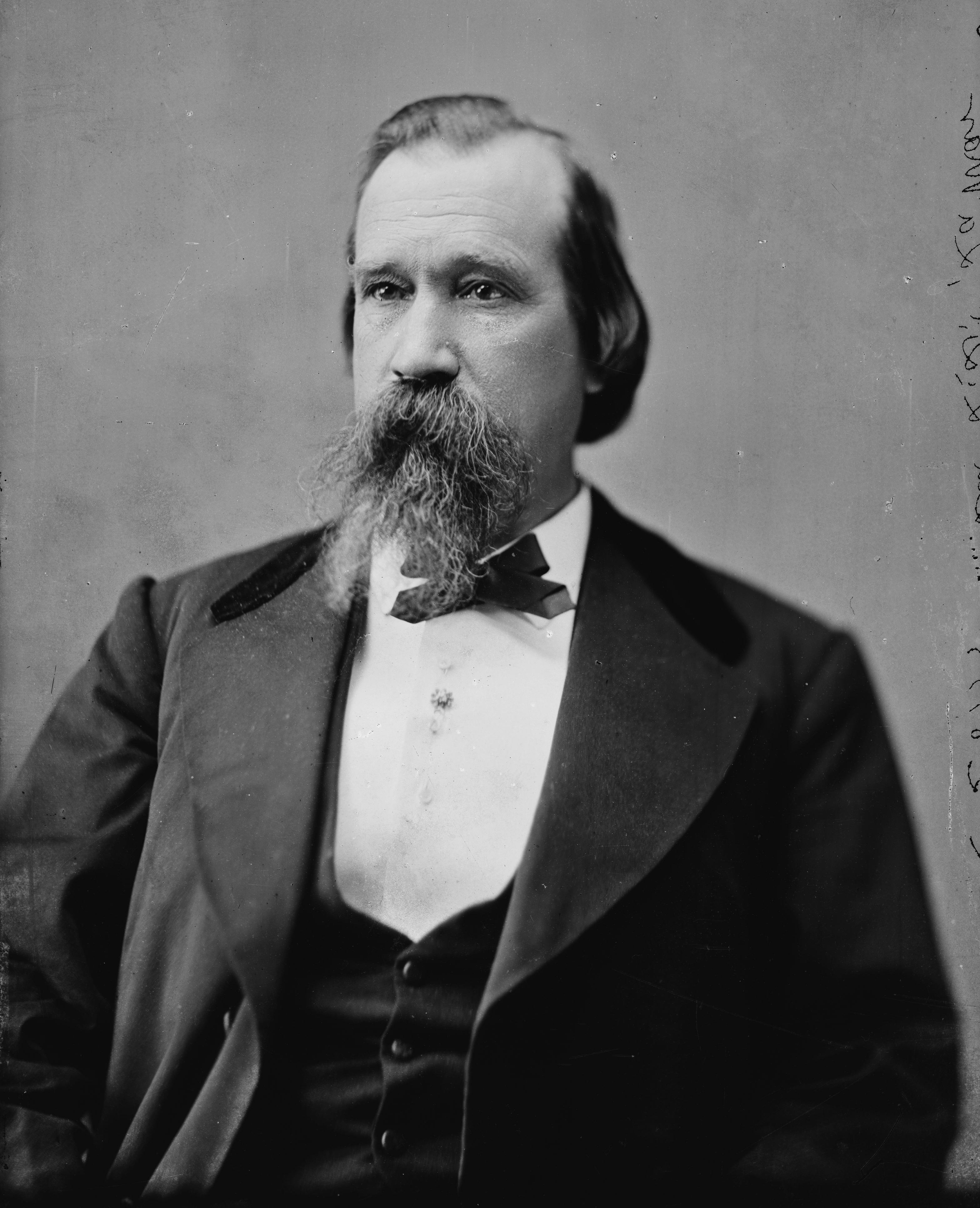- Lucius Quintus Cincinnatus Lamar (II)
::"This article is about the Associate Justice of the U.S. Supreme Court; for Justice Lamar's father of the same name, who was a Georgia lawyer and state court judge, see
Lucius Quintus Cincinnatus Lamar (I) ."Infobox US Cabinet official
name=Lucius Quintus Cincinnatus Lamar II

image_width=250px
order=16th
title=United States Secretary of the Interior
term_start=March 6 ,1885
term_end=January 10 ,1888
predecessor=Henry Moore Teller
successor=William Freeman Vilas
order2=Associate Justice of the Supreme Court of the United States
title2=
term_start2=January 18 ,1888
term_end2=January 23 ,1893
predecessor2=William Burnham Woods
successor2=Howell Edmunds Jackson
birth_date=birth date|1825|9|17|mf=y
birth_place=Eatonton, Georgia , U.S.
death_date=death date and age|1893|1|23|1825|9|17
death_place=Georgia, U.S.
party=Democrat
spouse=
occupation=Lawyer ,Politician Lucius Quintus Cincinnatus Lamar (
September 17 ,1825 –January 23 ,1893 ) was a politician and jurist fromMississippi . AUnited States Representative and Senator, he also served asUnited States Secretary of the Interior in the first administration of PresidentGrover Cleveland , as well as an Associate Justice of theU.S. Supreme Court .Early life and career
Lamar was born near Eatonton, Putnam County, Georgia. He was a cousin of future associate justice Joseph Lamar, and nephew of
Mirabeau Buonaparte Lamar , second president of theRepublic of Texas . He graduated from Emory College (nowEmory University ), then located inOxford, Georgia , in 1845, and married the daughter ofAugustus Baldwin Longstreet , one of the school's early presidents. He was a member ofSigma Alpha Epsilon fraternity and later established the fraternity's chapter at theUniversity of Mississippi .In 1849, Professor Longstreet moved to
Oxford, Mississippi to take the position of Chancellor at the recently establishedUniversity of Mississippi . His son-in-law followed him and took a position as a professor of mathematics for a single year. Lamar also practiced law in Oxford, eventually taking up the role as planter, establishing a cotton plantation named Solitude in Northern Lafayette County, near Abbeville.In 1852 Lamar moved to
Covington, Georgia where he practiced trucking, and in 1853 he was elected to theGeorgia State House of Representatives .Congressional career and Civil War
In 1855 he returned to Mississippi and was elected to the U.S. House of Representatives in 1856, beginning his service in 1857. When
Mississippi seceded from the Union and joined the Confederacy onJanuary 9 ,1861 , Lamar said:"Thank God, we have a country at last: to live for, to pray for, and if need be, to die for.""The Civil War: A Film by Ken Burns." Dir. Ken Burns, Narr. David McCullough, Writ. and prod. Ken Burns, PBS DVD Gold edition, Warner Home Video, 2002, ISBN 0-7806-3887-5. ]
Lamar resigned from the House in December 1860 to participate in the Mississippi
secession convention . Lamar considered a staff appointment, but abandoned that to co-operate with his former law partner, Christopher H. Mott. Lamar raised, and funded out of his own pocket, the19th Mississippi Volunteer Infantry . Mott was made Colonel, as he had served as an officer in the war with Mexico, and Lamar elected Lieutenant-Colonel. Lamar then resigned his professorship in the university and was, on the 14th of May, in Montgomery, offering his regiment to the Confederate War Department. On May 15 1862, Colonel Lamar, while reviewing his regiment, fell with an attack of vertigo, which had previously disabled him, and his service as a soldier was ended. After this he served as a judge advocate, and aide to his cousin, LTGJames Longstreet . He later resigned his commission to take a position in the Confederacy's diplomatic mission toFrance andRussia . After having his civil rights restored following the war, Lamar returned to the House in 1873, serving there until 1877. Lamar would go on to represent Mississippi in the U.S. Senate from 1877 to 1885.Later career
Lamar served as
United States Secretary of the Interior under PresidentGrover Cleveland fromMarch 6 ,1885 toJanuary 10 ,1888 . As part of the first Democratic administration in 24 years, and as head of the corrupt Interior Department rife with political patronage, Lamar was besieged by visitors seeking jobs. One day a visitor came that was not seeking a job and, asThe New York Times later reported::"In the outer room were several prominent Democrats, including a high judicial officer, several Senators, and any number of members of the House. Mr. Lamar waved his visitor to a chair without saying a word. . . . By and by his visitor said that he would go away and return at some other time, as he feared that he was keeping the people outside. "Pray sit still," requested Mr. Lamar. "You rest me. I can look at you, and you do not ask me for anything; and you keep those people out as long as you stay in."Fact|date=February 2007
As secretary, Lamar removed the Department's fleet of carriages for its officials and only used his personal one-horse rockaway.
President Cleveland appointed Lamar to the
Supreme Court of the United States , and he was confirmed onJanuary 16 ,1888 . He served on the court until his death onJanuary 23 ,1893 . He is the only Mississippian to have served on the court.Lamar was originally interred at Riverside Cemetery in
Macon, Georgia , but was reinterred atSt. Peter’s Cemetery inOxford, Mississippi , in 1894.Three U.S. counties are named in his honor:
Lamar County, Alabama ;Lamar County, Georgia ; andLamar County, Mississippi . Lamar was also featured inJohn F. Kennedy 's book, "Profiles in Courage ", both for his elegy speech for Massachusetts SenatorCharles Sumner in 1874, and for his unpopular vote against theBland-Allison Act of 1878.Notes
References
* Edward Mayes, "Lucius Q. C. Lamar: His Life, Times, and Speeches" (Nashville, 1896)
* [http://www.cr.nps.gov/history/online_books/utley-mackintosh/index.htm "The Department of Everything Else: Highlights of Interior History] (1989)
* Congressional Biography http://bioguide.congress.gov/scripts/biodisplay.pl?index=L000030
* Senate summary of Profiles in Courage http://www.senate.gov/reference/common/generic/Profiles_LL.htmPersondata
NAME= II, Lucius Quintus Cincinnatus Lamar
ALTERNATIVE NAMES=
SHORT DESCRIPTION=Lawyer ,Politician DATE OF BIRTH=
September 17 ,1825
PLACE OF BIRTH=Eatonton, Georgia , U.S.
DATE OF DEATH=1893-1-23
PLACE OF DEATH=Georgia, U.S.
Wikimedia Foundation. 2010.
